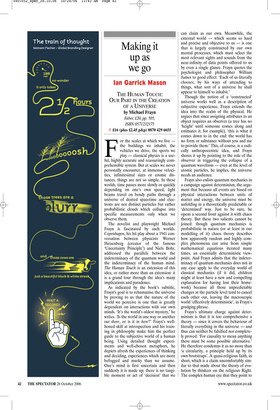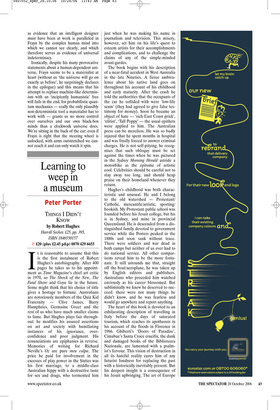Making it up as we go
Ian Garrick Mason
THE HUMAN TOUCH: OUR PART IN THE CREATION OF A UNIVERSE by Michael Frayn
Faber, £20, pp. 505, ISBN 0571232175
✆ £16 (plus £2.45 p&p) 0870 429 6655 For the scales at which we live the buildings we inhabit, the vehicles we drive, the sports we play — classical physics is a useful, highly accurate and reassuringly comprehensible system. But at scales we never personally encounter, at immense velocities, infinitesimal sizes or cosmic distances, things are not so simple. In these worlds, time passes more slowly or quickly depending on one’s own speed, light beams travel on bendy paths through a universe of dented spacetime and electrons are not distinct particles but rather probabilistic clouds which collapse into specific measurements only when we observe them.
The novelist and playwright Michael Frayn is fascinated by such worlds. Copenhagen, his hit play about a 1941 conversation between physicists Werner Heisenberg (creator of the famous ‘Uncertainty Principle’) and Niels Bohr, addressed the parallels between the indeterminacy of the quantum world and the indeterminacy of the human mind. The Human Touch is an extension of this idea, or rather more than an extension: it is a grand tour through the idea’s many implications and paradoxes.
As indicated by the book’s subtitle, Frayn’s goal is to rehumanise the universe by proving to us that the nature of the world we perceive is one that is greatly dependent on interactions with our own minds. ‘It’s the world’s oldest mystery,’ he writes. ‘Is the world in one way or another out there, or is it in here?’ Frayn’s wellhoned skill at introspection and his training in philosophy make him the perfect guide to the subjective world of a human being. Using detailed thought experiments and well-chosen metaphors, he depicts afresh the experiences of thinking and deciding, experiences which are more befogged and murky than we assume. One’s mind is first uncertain and then suddenly it is made up; there is no tangible moment or act of ‘decision’ that we can claim as our own. Meanwhile, the external world — which seems so hard and precise and objective to us — is one that is largely constructed by our own mental processes, which must select the most relevant sights and sounds from the near-infinity of data points offered to us by even a single glance. Frayn quotes the psychologist and philosopher William James to good effect: ‘Each of us literally chooses, by his ways of attending to things, what sort of a universe he shall appear to himself to inhabit.’ Though the notion of a ‘constructed’ universe works well as a description of subjective experience, Frayn extends the idea into the realm of the physical. He argues that since assigning attributes to an object requires an observer (a tree has no ‘height’ until someone comes along and estimates it, for example), ‘this is what it comes down to in the end: the world has no form or substance without you and me to provide them.’ This, of course, is a radically anthropocentric idea, and Frayn shores it up by pointing to the role of the observer in triggering the collapse of a quantum waveform — even at the level of atomic particles, he implies, the universe needs an audience.
Frayn also enlists quantum mechanics in a campaign against determinism, the argument that because all events are based on physical interactions between units of matter and energy, the universe must be unfolding in a theoretically predictable or ‘determined’ way. Just to be sure, he opens a second front against it with chaos theory. But these two salients cannot be joined: though quantum mechanics is probabilistic in nature (or at least in our modelling of it) chaos theory describes how apparently random and highly complex phenomena can arise from simple mathematical equations iterated many times, an essentially deterministic viewpoint. And Frayn admits that the indeterminacy of quantum mechanics does not in any case apply to the everyday world of classical mechanics (if it did, children might at least have a new and compelling explanation for having lost their homework) because all those unpredictable changes at the particle level tend to cancel each other out, leaving the macroscopic world ‘effectively deterministic’, in Frayn’s grudging phrase.
Frayn’s ultimate charge against determinism is that it is too comprehensive a theory — since it covers the behaviour of literally everything in the universe — and thus can neither be falsified nor completely proved: ‘For causality to mean anything there must be some possible alternative.’ He therefore condemns it as no more than ‘a circularity, a principle held up by its own bootstraps’. A quasi-religious faith, in short, which is a claim uncomfortably similar to that made about the theory of evolution by thinkers on the religious Right. The complex human eye that they point to as evidence that an intelligent designer must have been at work is paralleled in Frayn by the complex human mind into which we cannot see clearly, and which therefore serves as evidence of universal indeterminacy.
Ironically, despite his many provocative statements about a human-dependent universe, Frayn seems to be a materialist at heart (without us ‘the universe will go on exactly as before’, he surprisingly declares in the epilogue) and this means that his attempt to replace machine-like determinism with an ‘incipiently humanistic’ free will fails in the end, for probabilistic quantum mechanics — really the only plausibly non-deterministic tool a materialist has to work with — grants us no more control over ourselves and our own black-box minds than a clockwork universe does. We’re sitting in the back of the car; even if Frayn is right that the steering wheel is unlocked, with arms outstretched we cannot reach it and can only watch it spin.



























































































 Previous page
Previous page